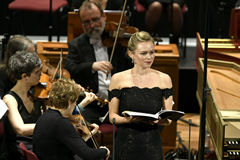| Opera Reviews | 26 April 2024 |
Judas Maccabaeus evokes Middle East conflicts |
|
| Handel: Judas Maccabaeus International Handel Festival Göttingen May 2018 |
|
|
There’s irony, then, in a performance on the very day the Middle East hots up a notch with Israel and Iran trading rockets over the same territory as Judas fought. Who said classical music is irrelevant to real life? Deanna Breiwick and Sophie Harmsen, as the Israelitish Woman and Man respectively, were perfectly matched for their duets. Breiwick’s brighter, soprano sound and the rich, creamy voice of Harmsen are sufficiently different for their separate lines to be clear. Yes, ‘O lovely peace’ is a stalwart of 20th century school song-books, but Breiwick and Harmsen sang it delightfully, with complementary ornamentation, and charming flute echoes from Kate Clark. Some critics claim the oratorio lacks drama and Judas does tend to make political speeches, rather than emote or converse. Kenneth Tarver approached it in a forthright way, maintaining his strong sound at both ends of his range, particularly noticeable in the air ‘How vain is man’, in which the melody jumps all over the place. He held his own well against the trumpets and tympani in ‘Sound an alarm!’ and also in his duet with trumpets ‘With honour let desert be crown’d’. The NDR Chor (chorus master David Cavelius) warmed up to a smooth, silken sound and produced a nice crescendo in the line ‘for laws, religion, liberty, we fall.’ Their diction was precise – important in so wordy a narrative as this. The FestspielOrchester Göttingen played with their customary verve for conductor Laurence Cummings. Highlights were the crisp, clean strings in “Fall’n is the foe’, and the low strings in the soprano air ‘Ah! Wretched, wretched Israel!’ Oh, and, of course, the trumpets. As the original edition was being used, we did not see (or hear) the conquering hero until the audience’s enthusiastic response to the performance was rewarded and the NDR Chor sang it with a sparkling brightness, accompanied by a similar sound from FOG.
|
|
| Text ©
Catriona Graham Photo © Theodoro da Silva |

 With its paeans to peace and liberty, Handel’s oratorio Judas Maccabaeus was written to celebrate the end of the 1745 Jacobite rebellion, and programmed by Göttingen International Handel Festival to commemorate the end of the First World War. It tells how the Jewish hero successfully fought against the Seleucid empire, won back Jerusalem and purified the temple. The Israelitish Man sings about Judas pursuing all Samaria through hills of carnage and how Seron, “Syria’s boast”, fell with his unnumbered host.
With its paeans to peace and liberty, Handel’s oratorio Judas Maccabaeus was written to celebrate the end of the 1745 Jacobite rebellion, and programmed by Göttingen International Handel Festival to commemorate the end of the First World War. It tells how the Jewish hero successfully fought against the Seleucid empire, won back Jerusalem and purified the temple. The Israelitish Man sings about Judas pursuing all Samaria through hills of carnage and how Seron, “Syria’s boast”, fell with his unnumbered host.






